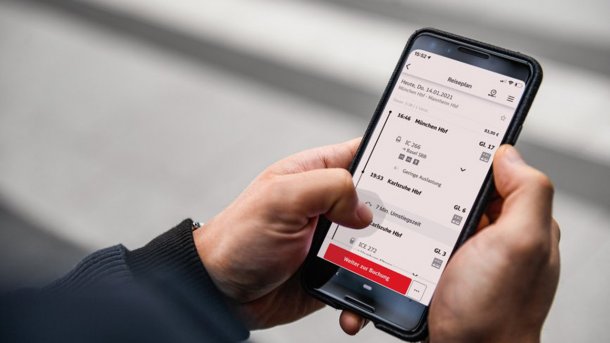Petition to the Bundestag for a right to life without digital constraints
On the 75th anniversary of the Basic Law, Digitalcourage has launched a petition to the Bundestag to enshrine the right to a life without digital constraints.

For Digitalcourage, DB Navigator is an example of excessive digitalization.
(Image: Deutsche Bahn)
The Digitalcourage association has initiated a petition to the German Bundestag to include the right to life without digital coercion in the Basic Law. "In more and more places, we are being forced to log in, register online or download an app - and to disclose more and more personal data in the process," explains Rena Tangens, founder and board member of the association. This would exclude many people, old or sick people, people with disabilities and people on low incomes.
In addition, more and more data is being collected, which makes it possible to monitor all areas of life. People should be free to decide whether they want to own one and when they wish to be out and about with such a device. "We also want to be free to decide which software and which operating system we install on our devices," the petition states. In it, Digitalcourage points out that society's dependence on digital solutions is risky. It is good if there is still a non-digital way available.
Videos by heise
As an example of digital coercion, Digitalcourage cites the practices of Deutsche Post DHL, for which the association presented the company with one of its negative Big Brother Awards last year. Compartments at some packing stations can only be opened with a smartphone. In addition, Deutsche Post uses customers' smartphones to establish a connection to the control center. The data protection activists from Digitalcourage are also critical of the Doctolib doctor's appointment platform. They also criticize Deutsche Bahn, which forces people to use the DB Navigator app. In 2022, Digitalcourage filed a lawsuit against the app's extensive tracking at Frankfurt am Main Regional Court.
"The problem will not 'die away'"
Digitalcourage launched the petition to the Bundestag on the occasion of today's 75th anniversary of the Basic Law. The exercise of fundamental rights and services of general interest, participation in social life and the use of public infrastructure should not be made dependent on people using the internet, a smartphone or certain software.
"There are people who claim that this is a problem that will eventually 'die away'. That's not only cynical, but also simply wrong," says Tangens. The digital compulsion doesn't just affect senior citizens, but also people who take their right to informational self-determination seriously, who don't want to install apps on their device indiscriminately and don't want to leave a data trail with every everyday action. People who use alternative operating systems or deliberately reject app stores from large providers are also excluded from digital services.
"Time is of the essence"
Digitalcourage has no objections to "well-thought-out, data protection-friendly digitalization" if analogue access exists at the same time. However, digitalization "seems to mean for many: We'll make an app now and only offer all our services via it," says Julia Witte from Digitalcourage. With creativity and foresight, better, more inclusive solutions could be found.
"Time is pressing because more and more analog services that were previously available to us are being abolished," said Tangens. It will be difficult to rebuild this infrastructure later once it has disappeared. The association emphasizes that it will also offer the opportunity to sign the petition offline on paper.
(anw)